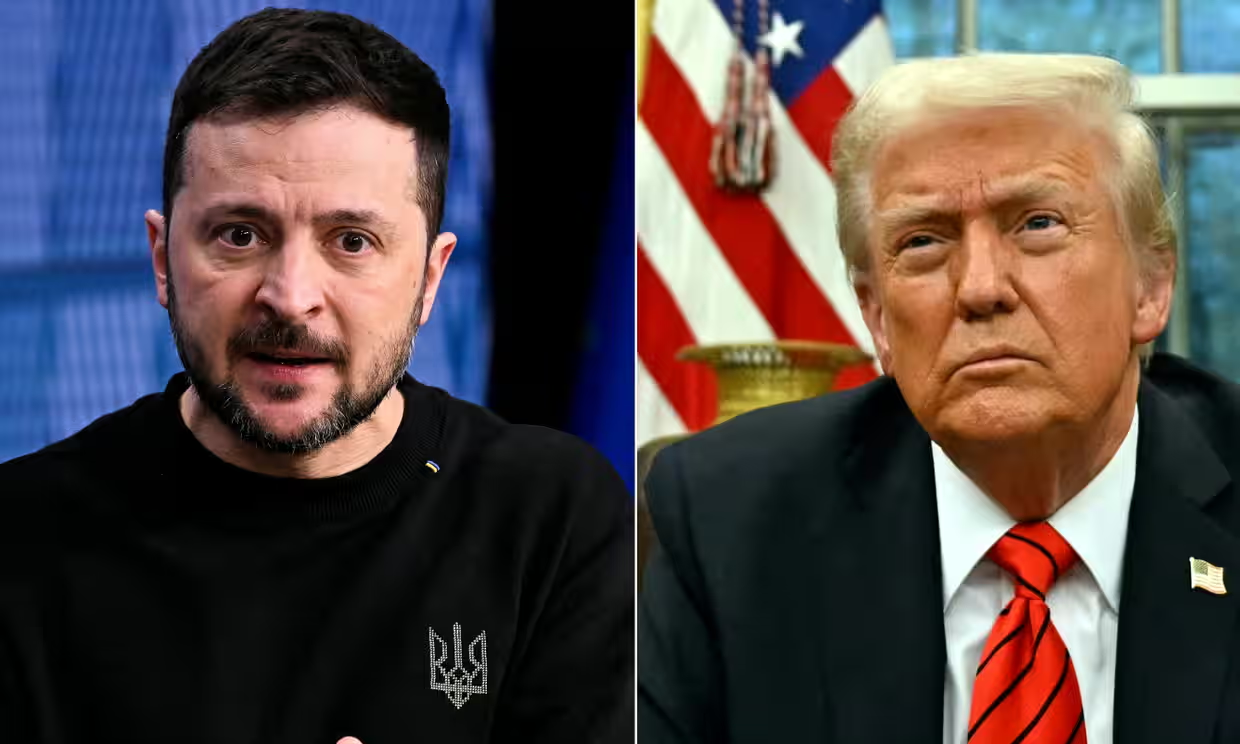Trump Calls Zelenskyy a Dictator Amid Rising US-Ukraine Rift: The relationship between the United States and Ukraine appears to be heading toward a serious rupture after former U.S. President Donald Trump intensified his criticism of Ukrainian President Volodymyr Zelenskyy, calling him a “dictator” and warning that he “better move fast” or he “won’t have a country left.” The remarks, which Trump made on Truth Social, came in response to Zelenskyy’s assertion that Trump was trapped in a Russian “disinformation bubble.”
A War of Words Between Trump and Zelenskyy
Trump’s attack on Zelenskyy marks an escalation of tensions between Kyiv and Washington. His statement, which contained multiple unfounded claims, suggested that Ukraine bore responsibility for Russia’s 2022 invasion. Trump also accused Zelenskyy of prolonging the war for personal gain, suggesting that the Ukrainian leader had benefited from U.S. financial and military support.
On Truth Social, Trump wrote, “A Dictator without Elections, Zelenskyy better move fast or he is not going to have a Country left.” He also labeled Zelenskyy “a modestly successful comedian” and alleged that the Ukrainian leader had convinced the United States to spend $350 billion on a war that was unwinnable. Additionally, Trump claimed that the Ukrainian president had manipulated U.S. President Joe Biden, stating, “The only thing he was good at was playing Biden ‘like a fiddle.’”
These remarks came after reports that senior U.S. and Russian officials held a secret meeting in Saudi Arabia to discuss the war in Ukraine, without Kyiv’s participation. This development fueled concerns that Trump might push for a peace deal favorable to Russian President Vladimir Putin, sidelining Ukraine’s interests.
Zelenskyy Responds to Trump’s Claims
In a combative press conference in Kyiv, Zelenskyy rejected Trump’s claims, saying that the former U.S. president was “pushing a lot of disinformation coming from Russia.” The Ukrainian leader stated, “Unfortunately, President Trump, with all due respect for him as the leader of a nation that we respect greatly … is trapped in this disinformation bubble.”
Zelenskyy also dismissed Trump’s claims that he had refused to hold elections, explaining that Ukrainian law prohibits elections during martial law, which has been in place since Russia’s invasion. He countered Trump’s assertion that his approval rating was as low as 4%, pointing out that recent polling showed 57% of Ukrainians still trusted him.
He added, “Inventing ‘democracy’ under shelling is not democracy, but a spectacle in which the main beneficiary is in the Kremlin. Ukraine needs bullets, not ballots.”
International Reactions and Concerns
Trump’s comments sparked international reactions, with several Western leaders voicing support for Zelenskyy. British Prime Minister Keir Starmer reaffirmed his backing for “Ukraine’s democratically elected leader,” adding that suspending elections during wartime was reasonable, citing the UK’s similar decision during World War II. German Chancellor Olaf Scholz also condemned Trump’s statements, calling them “wrong and dangerous.”
Trump’s former vice-president, Mike Pence, also criticized the remarks, stating, “Mr. President, Ukraine did not ‘start’ this war. Russia launched an unprovoked and brutal invasion, claiming hundreds of thousands of lives. The road to peace must be built on the truth.”
The Future of U.S.-Ukraine Relations
Trump’s latest remarks could have serious implications for future U.S. aid to Ukraine. Zelenskyy has previously acknowledged that without continued American support, Ukraine’s chances of survival would be severely diminished. While the Biden administration remains committed to supporting Ukraine, a potential Trump-led government could alter the U.S.’s stance, pushing for negotiations that could favor Moscow.
Another point of contention is Trump’s suggestion that Ukraine should offer 50% of its critical mineral resources as a form of “down payment” for continued U.S. aid. Zelenskyy dismissed this proposal, stating that he could not “sell Ukraine away” but was open to negotiating a “serious document” that included security guarantees.
As the war in Ukraine rages on, the deepening divide between Trump and Zelenskyy raises questions about the future of U.S. involvement in the conflict. While Ukraine looks for continued Western support, Trump’s rhetoric suggests that if he returns to power, Kyiv may have to prepare for a dramatic shift in U.S. foreign policy.
